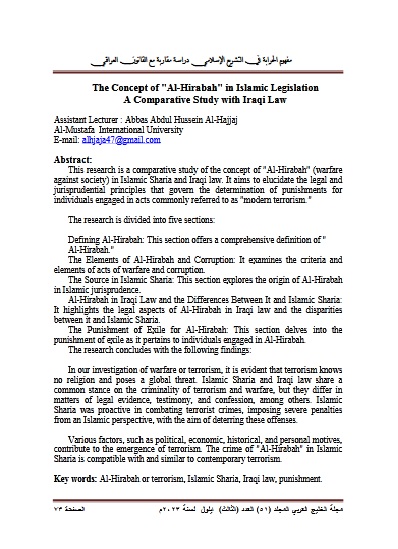The Concept of "Al-Hirabah" in Islamic Legislation A Comparative Study with Iraqi Law
Keywords:
Al-Hirabah or terrorism, Islamic Sharia, Iraqi law, punishmentAbstract
This research is a comparative study of the concept of "Al-Hirabah" (warfare against society) in Islamic Sharia and Iraqi law. It aims to elucidate the legal and jurisprudential principles that govern the determination of punishments for individuals engaged in acts commonly referred to as "modern terrorism."
The research is divided into five sections:
Defining Al-Hirabah: This section offers a comprehensive definition of "
Al-Hirabah."
The Elements of Al-Hirabah and Corruption: It examines the criteria and elements of acts of warfare and corruption.
The Source in Islamic Sharia: This section explores the origin of Al-Hirabah in Islamic jurisprudence.
Al-Hirabah in Iraqi Law and the Differences Between It and Islamic Sharia: It highlights the legal aspects of Al-Hirabah in Iraqi law and the disparities between it and Islamic Sharia.
The Punishment of Exile for Al-Hirabah: This section delves into the punishment of exile as it pertains to individuals engaged in Al-Hirabah.
The research concludes with the following findings:
In our investigation of warfare or terrorism, it is evident that terrorism knows no religion and poses a global threat. Islamic Sharia and Iraqi law share a common stance on the criminality of terrorism and warfare, but they differ in matters of legal evidence, testimony, and confession, among others. Islamic Sharia was proactive in combating terrorist crimes, imposing severe penalties from an Islamic perspective, with the aim of deterring these offenses.
Various factors, such as political, economic, historical, and personal motives, contribute to the emergence of terrorism. The crime of "Al-Hirabah" in Islamic Sharia is compatible with and similar to contemporary terrorism.




